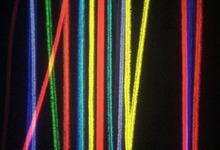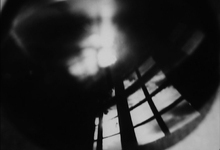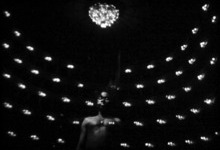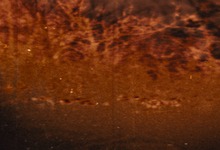ANALOGUE FUTURES és un programa que ha preparat Crater-Lab en colaboració amb Light Cone, i la participació del Cine-Cooperativa Zumzeig, on programarem algunes de les seves sesions de cinema experimental y analògic.
Aquest programa és una carta blanca oferida a Emmanuel Lefrant, cineasta i director de la cooperativa parisina Light Cone, una colecció de 4000 pel·lícules experimentals.
Lefrant viu i treballa a París, on crea obres en celuloide auto-produïdes. Per aquest programa ha convidat a diversos amics amb els que ha treballat en el passat, i amb els quals comparteix el mateix interés per la materialitat de la pel·lícula i la fe en el poder del mitjà analògico.
La sessió serà presentada pel propi cineasta.
PROGRAMA
—————
by Emmanuel LEFRANT
2006 / 16 mm / color / son / 24 ips / 6′ 00This is a deserted black space that one tries to fill in. To the point of becoming totally submerged in color. One explores the chromatic circle, by turning around it meticulously. And by vertical unreeling, a process specific to cinema. BLITZ turns a page opened two years ago in Canada. I started to work on line patterns with the collective PHYLM, for a performance, and then for an installation. Once back in France, I re-explored this figure with the nominoë collective, and the performance LI[GHT]NES.

by BECKS Christopher & MILLER Peter
2012 / 16 mm / b&w / son / 24 ips / 3′ 30How do you find what you don’t know you’re looking for?

by Emmanuel LEFRANT
2009 / 35 mm / color / son / 24 ips / 7′ 00Africa, 2003: the mechanisms of memory.I shot the image of a landscape and buried simultaneously a film strip in the same place where the sequence was shot: the emulsion, the victim of erosion is thus subjected to biochemical degradation. The result of these natural processes of decay are then conserved in the state of their dissolution. Those two images, and their negative versions, are then entangled together thanks to double exposure and bi-packing techniques.These landscapes in fusion, it’s the logic of a world that reveals itself. A bipolar world, where invisible takes shape with the visible, where the first dissolves itself into the second and vice versa.

by Christopher BECKS
2010 / 35 mm / b&w / sil / 24 ips / 5′ 00An in-camera improvisation for a barn in Normandy.

by CANAPA Stefano & RIBES Elisa
2016 / 35 mm / b&w / son / 24 ips / 11′ 15Kairos is a poetic dance film set against a Mediterranean background. Film, nature and the body are brought together to produce an interconnected material choreography. Kairos talks about the loss of the myth of Mermaids while also evoquing the odyssey of the today’s migrants, between exil and resistance. For the Greeks, Kairos signifies the point where everything can happen, that point you can choose to do something or not…

by Guillaume CAILLEAU
2013 / 16 mm / b&w / sil / 24 ips / 3′ 00Abdou’s Dread in Teatro Argentina, Roma. – a portrait of Abdou ouologuem – On tour with “A Magic Flute” by P. Brook: between 2 rehearsals, Abdou is showing me how he manages his dread on stage. A portrait by Guillaume Cailleau As himself, Abdou Ouologuem. Light by Jean Dauriac

by BECKS Christopher & LEFRANT Emmanuel
2016 / 35 mm / color / son / 24 ips / 4′ 10A Film of Symbolically Authentic Non-Euclidean Adventures.

by Peter MILLER
2005 / 35 mm / color / sil / 24 ips / 10′ 00A portrait of seven screens as recorded by their projectors. Projector Obscura is a series of films that are exposed using projectors rather than cameras. The extreme similarity between the design of the motion picture camera and projector is such that if the projection booth is adequately darkened and unexposed film is run through a projector, light illuminating the theater will enter the projector lens and expose the film.35mm film projectors used this way will record the objects and space before them, exposing the relationship between two fixed elements in the cinema: the projector and the screen. In “Projector Obscura”, the lens, which is normally responsible for casting out so many images, is given a chance to take in light and reflect upon its theatrical space, and the screen is given a chance to stand bare.The theaters shown here are the Biograph, the Gene Siskel Film Center, Anthology Film Archives, Gateway, MFA-Boston, Coolidge Corner and Harvard Film Archive.

by Daïchi SAÏTO
2007 / 16 mm / color / son / 24 ips / 7′ 00Juxtaposition of seeing and sounding, sky and stone and all that’s in between. A short walk in an alleyway, to hear vision sounding images, blessed with light and darkness.

by Emmanuel LEFRANT
2015 / 35 mm / color / son / 24 ips / 11′ 30– What do you see? – A place not suited for humans being Le Pays Dévastérelates to the Anthropocene, the current geological age, viewed as the period during which human activity has been the dominant influence on climate and the environment.

+info: Zumzeig Cinema
Duració aproximada: 68 min.
Format de projecció: Format 16mm i 35mm.
Data i Hora: Disabte, 26, a las 20:30h.
Lloc: Zumzeig Cinema, Béjar 5, Barcelona
Preu: 6 euros (inclou consumició)
Col·labora Ajuntament de Barcelona


Comments are closed